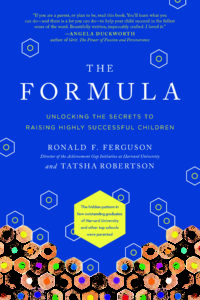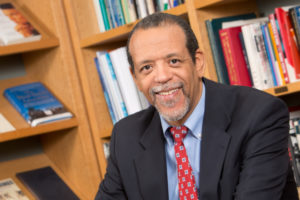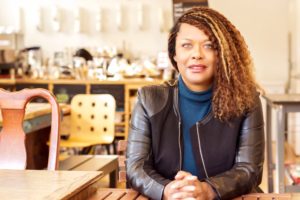The Formula: Unlocking the Secrets to Raising Highly Successful Children by Ronald F. Ferguson and Tatsha Robertson (Book Excerpt)
 The Navigational Voice in their Head
The Navigational Voice in their Head
When he turned five, Sangu began a strange nightly ritual based on something his mother would tell him: “Before you say your bedtime prayers, I want you to go and look in the mirror in the bathroom, and ask yourself: ‘What have I accomplished today? Can I really feel confident that I’ve actually done something useful today?’ And if you feel confident that you’ve actually done something today, say your bedtime prayers, and go to bed.” Many nights, he’d need to head to the family’s small home library to read or study “until I felt I had met the threshold” by learning something new.
Even when Sangu was off to college, his mother’s words were always in his head, and to this day, they serve as a guiding force, an opportunity for personal growth not to be squandered.
“I’ve literally had days where I pray and I’m about to go to bed and I say, ‘I didn’t do anything productive today.’ And I won’t go to bed because I can’t go to bed when I had a day when I didn’t accomplish anything. So, I’ll go back and read something.”
That isn’t to say he’s always appreciated his mother’s words. “At the time, I thought it was very bizarre. I remember thinking, ‘Why am I doing this?’ But, the older I got, the more I appreciated why she did it.”
All of our master parents passed on distinctive nuggets of advice like Sangu’s mother, which are echoed many years later by an internal voice in their grown child’s head, providing wisdom and guidance when most needed.
Recall the internal voice that told Rob Humble he could build that robot his freshman year of college. Full of anxiety, feeling inadequate, Rob needed a reason to believe he could succeed in a challenge that seemed overwhelming. Bob Senior, his father, had been showing Rob his entire life that he could figure things out. In fact, Rob’s favorite saying of his father’s was, “If you can break it down, you can figure it out”—exactly what that internal voice reminded Rob to do that day in college.
The lesson Chuck Badger’s mother Elaine instilled in her youngest son was the importance of self-presentation. As she always told him, “Appearance is everything. You get one chance to make a first impression.” She understood that people would treat him with respect, or not, depending upon his appearance, and decided he needed to “appear middle class,” which to her meant dressing a certain way. Chuck heard more times than he can count that “just because you live in the projects, the projects don’t have to live in you.”
As Elaine explained, “I just did not allow certain things, like low pants, untied shoes, and unkempt hair. I would just obsess with the way he looked when he walked out the door. He had to look presentable. I was raised that way so that’s why I raised him that way.”
That mantra, “be presentable,” continues to guide Chuck as he walks with confidence among the giants of politics. From the colorful socks he wears to his signature bow tie, his cuff-link collection, and the seersucker suits he’s known to don, Chuck still lives by his mother’s belief that someone out there is always sizing you up.
The lessons Maggie’s mother taught her on the physics of poise,back when she was a tiny violinist trying to stand on a foot chart, were with her more than two decades later as she stood proudly on the stage at Carnegie Hall. As Bree Newsome looked down on the police officers at the base of that flagpole on South Carolina’s capitol grounds, she remembered everything her father had told her about taking a stand in life. And when David Martinez, the American diplomat, had to help decide which Iraqi citizens would be permitted to immigrate to the United States, he heard echoes of his parents’ words imploring him to imagine himself in others’ shoes, especially those less fortunate.
That parental voice that Rob, Chuck, Maggie, Bree, David, and others carried with them was the last and most unusual role in the Formula, the GPS. Through repetition and consistency over many years, the master parent’s pearls of wisdom become permanently installed in the adult child’s memory, like the navigational voice of a global positioning system device that helps prevent wrong turns.
This role is different from others within the Formula in that, rather than impacting the child in real time, the parent as GPS communicates across time, from the past, through what the child remembers them saying or doing. Those memories are the culmination of everything the parent has done in all the other roles of the Formula, and they return to the child in the form of an echo at moments when, as an adult, they have a decision to make or a challenge to overcome.
In the chapter about siblings, we talked about the importance of a child’s receptivity in determining how much they learn from a parent, but it’s in adulthood where this quality bears the greatest fruit. Master parents pass along wisdom to their children through many roles: the Philosopher (think of Sangu’s father telling him to avoid sycophants), the Negotiator (recall the practical advice Michelle gave Maya about her teacher), and even the Model (think of Ryan’s father showing him how to be a leader). But some children are more receptive to that knowledge than others. Our high achievers were very receptive. They not only heard the advice given to them by the master parents, they packed it away and carried it along with them. Their parents’ wisdom stayed with them—in the form of the navigational voice.
But the parent as the navigational voice is more than a collection of aphorisms; these pithy expressions are just one form the role takes. More broadly, the parental GPS is a map of insights stitched together from lessons the child has learned from their parents about life. It provides a sense of direction that helps the adult achievers navigate their own lives and become fully realized human beings
About the Authors of The Formula….
 Ronald F. Ferguson, PhD, joined the faculty at Harvard’s John F. Kennedy School of Government in 1983 and has spent his career using teaching, research and writing to increase the flow of knowledge between the university and the world. An MIT-trained economist who focuses on economic, social, and educational challenges, he co-founded Tripod Education Partners and is now a fellow at Harvard’s Malcolm Wiener Center for Social Policy and faculty director of the Achievement Gap Initiative. Ron’s current focus is the initiative titled Boston Basics. Inspired by the fact that birth-to-three is a critical period for learning, the Basics Campaign strives to provide advice and support to parents of infants and toddlers. Ron holds an undergraduate degree from Cornell University and a PhD from MIT. He has been happily married for 38 years and is the father of two adult sons.
Ronald F. Ferguson, PhD, joined the faculty at Harvard’s John F. Kennedy School of Government in 1983 and has spent his career using teaching, research and writing to increase the flow of knowledge between the university and the world. An MIT-trained economist who focuses on economic, social, and educational challenges, he co-founded Tripod Education Partners and is now a fellow at Harvard’s Malcolm Wiener Center for Social Policy and faculty director of the Achievement Gap Initiative. Ron’s current focus is the initiative titled Boston Basics. Inspired by the fact that birth-to-three is a critical period for learning, the Basics Campaign strives to provide advice and support to parents of infants and toddlers. Ron holds an undergraduate degree from Cornell University and a PhD from MIT. He has been happily married for 38 years and is the father of two adult sons.
 Former magazine editor Tatsha Robertson is an award-winning editor and writer with over 20 years of experience. As the first female NYC Bureau Chief and National Rover for The Boston Globe, she covered some of the nation’s largest stories, including Katrina, September 11th, and other major crime stories. She pioneered Essence magazine’s focus on investigative and news articles, which ultimately led to an interview with President Obama. Most recently, she was the crime editor at People Magazine. Robertson is a frequent guest on national media and currently teaches journalism at NYU.
Former magazine editor Tatsha Robertson is an award-winning editor and writer with over 20 years of experience. As the first female NYC Bureau Chief and National Rover for The Boston Globe, she covered some of the nation’s largest stories, including Katrina, September 11th, and other major crime stories. She pioneered Essence magazine’s focus on investigative and news articles, which ultimately led to an interview with President Obama. Most recently, she was the crime editor at People Magazine. Robertson is a frequent guest on national media and currently teaches journalism at NYU.















